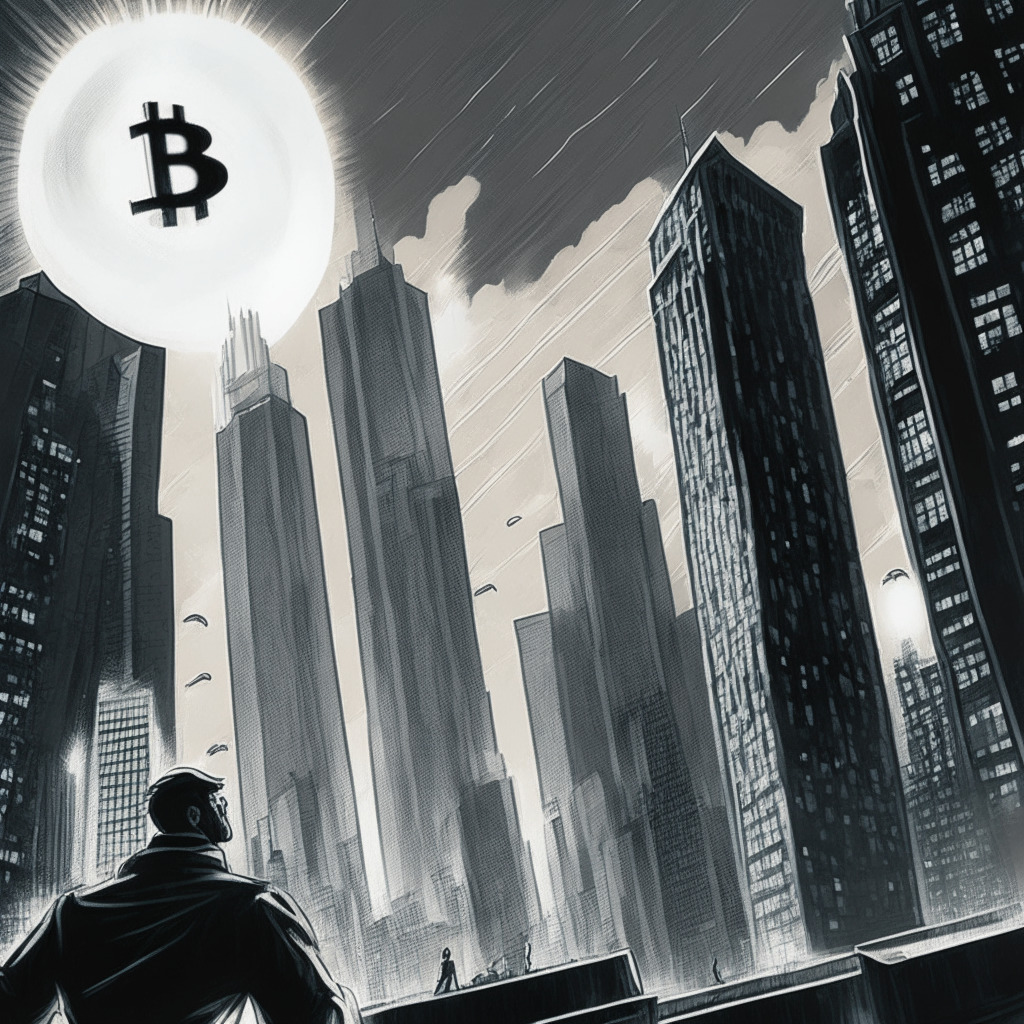“Several Chinese banks are considering incorporating the digital yuan, or e-CNY, into their services. Industrial Bank has introduced a CBDC-powered service for bulk commodity spot clearing. More banks are joining People’s Bank of China’s pilot programme, signalling a significant shift in China’s financial landscape.”
Search Results for: First Digital
Digital Dollar Race: Wyoming’s State Stablecoin and the National Push Towards Blockchain Adoption
“Wyoming seeks to establish a state stablecoin, with the state posting a job opening for a Stable Token Commission head to create legislative frameworks for the project. Meanwhile, Texas lawmakers aim to create a gold-backed digital currency, indicating an emerging inter-state rivalry in digital currency initiatives.”
The Digital Ruble Takes Center Stage: Potential Lifeline or Invasion of Financial Privacy?
“Vladimir Putin has signed the Digital Ruble Bill into law, enabling Russia’s Central Bank to launch its own digital currency. The digital Ruble, a Central Bank Digital Currency (CBDC), can serve as both a tool against international sanctions and a means of monitoring governmental expenditure on social projects. However, there are concerns it could be used to control citizens’ spending.”
Navigating through Nigeria’s eNaira: A Leap or a Stumble towards a Digital Future?
Nigeria’s Central Bank remains committed to their digital currency project, eNaira, despite changes in leadership. The bank has moved to integrate Near Field Communication technology to support contactless payments. The implementation is hoped to enhance acceptance of the CBDC, with the bank highlighting the app’s many benefits, including programmable capabilities and the support of intervention programs. However, challenges remain, including lower than expected adoption rates and tensions with commercial banks.
Prospects and Hurdles: An Analysis of China’s Digital Yuan Adoption and Its Global Impact
China’s central bank, the People’s Bank of China (PBoC), executed $250 billion in transactions using the Central Bank Digital Currency (CBDC), named digital yuan, over an 18-month period. Remarkably, a mere 0.16% of China’s currency supply is in digital yuan. Despite a substantial transaction milestone, the currency’s utilization rate within China’s vast economy remains relatively limited.
Emerging Digital Finance Trends: Open Banking to Embedded Finance and Beyond
“Five emerging trends shaping the future of digital finance: Open Banking, enabling data sharing for improved services; Digital wallets for safer, contactless payments; Blockchain technology for faster transactions; AI-powered financial services, and Embedded finance, integrating financial services into non-financial software.”
Myanmar’s First Cryptocurrency Bank: A Revolutionary Leap towards Financial Liberty
Myanmar is set to launch its first institution operating solely on cryptocurrency, the Spring Development Bank, aiming to facilitate smoother cross-border transactions. Constructed on the Polygon network, this financial platform leverages blockchain technology for global accessibility, combating international transfer fees with the deployment of stablecoins.
Navigating French Crypto Regulation: How SG Forge Acquired First Full DASP License
SG Forge, Societe Generale’s digital asset unit, has procured a Digital Asset Service Provider (DASP) license and become the first entity to achieve this certification in France. The company’s strides in adhering to regulatory requirements highlight the importance of alignment with the European Union’s crypto regulations, providing assurance of both compliance and banking security.
Digital Art Meets AI: An Exploration of Ellie Pritts’ Blockchain Ventures, and the Future of Artistic Expression
“Pritts, through the integration of blockchain and AI, transformed her therapeutic video art into monetized pieces. AI stepped in as her neurological disorder restricted traditional tools; birthing a new breed of artists and challenging traditional art methodologies.”
The Digital Ruble’s Accelerated Path: CBDC Advancements amidst International Intrigue
“Russia’s CBDC project, a centralized Digital Ruble, is projected for completion by 2025-2027. The Central Bank aims for the digital ruble to coexist with traditional cash, fostering a flexible transaction ecosystem. Despite potential losses, legislation outlines a framework for the digital ruble ecosystem that ensures high-level cybersecurity and reliability in a balanced, meticulously designed solution.”
Forge: France’s First Licensed Crypto Provider – A Market Equalizer or Monopoly?
Forge, a Societe Generale subsidiary, is now France’s first licensed crypto provider. The company can custody, buy, sell, and trade digital assets for legal currency. However, the stringent approval process favors traditional banks, causing concerns over market fairness. This development underscores the balance between crypto business growth and regulatory prudence.
Rushing towards Russia’s Digital Ruble: A Leap of Progress or a Hasty Endeavour?
Russia’s Central Bank plans to introduce its digital ruble by 2025, amid keen interest from the country’s financial institutions. This comes as U.S. and EU-led sanctions hinder Moscow’s dollar trade, incentivizing their shift to a digital currency. Despite international skepticism, Russia is exploring cross-border CBDCs and partnerships with “friendly countries.” Amid this eager transition, experts emphasize the importance of maintaining safety and traditional systems.
Navigating Crypto Regulations: The SEC-Prometheum Controversy & Future of Digital Assets
“Congressman Ritchie Torres has raised concerns about a ‘sweetheart deal’ between the United States Securities Exchange Commission (SEC) and Prometheum, a digital assets platform. Torres highlights the SEC’s lack of transparency in the handling of digital assets law enforcement and its supposedly failed process of registering digital asset platforms.”
Cross-Border Potency of Digital Rubles and Yuan: Boon or Bane for International Trade?
The dialogue between Russia and China’s central banks is accelerating speculation around Central Bank Digital Currencies (CBDCs). While Russia aims for early initiation with domestic commercial banks, China is progressing with offline and CBDC wallet tests. Meanwhile, Russia’s new legislation permits “non-residents” to own digital ruble wallets, establishing the digital ruble as an international trading tool. These developments challenge traditional banking norms and raise questions concerning international trade norms, regulations, and digital security.
Rise of Stablecoins: Will They Topple the US Dollar’s Dominance in the Digital Age?
“Jeremy Allaire, the CEO of Circle, warns of the risk to the US dollar’s status as the leading global reserve currency in the face of rising stablecoins. Allaire emphasizes the need to regulate stablecoins and develop trust in digital dollars, as cryptocurrency is poised to revolutionize the payment system, potentially saving a trillion-dollar economic toll from traditional financial system inefficiencies.”
Blockchain Revolution in Sports: The Rise of Interactive NFTs and New Digital Engagement Tactics
“Interactive Non-Fungible Tokens (NFTs) are changing the game for sports memorabilia, with digital-first approach providing accessibility to fans worldwide. Partnerships between sports icons, digital artists and sports organizations give birth to unique blends of sports data and digital art, while still questioning how to effectively display digital art.”
Grayscale vs BlackRock: The Race for the First Bitcoin ETF and SEC’s Gatekeeping Role
“Grayscale Investments CEO, Michael Sonnenshein, believes the creation of a Bitcoin exchange-traded fund (ETF) isn’t a distant prospect but a definite achievement. He discusses the potential of BlackRock establishing the first Bitcoin ETF. This relates to the SEC’s refusal to green-light spot Bitcoin ETFs, citing they are too risky for retail investors. But, prospects look brighter as financial ecosystem shows an increased appetite for ETFs, increasing investment opportunities.”
Delayed Launch of Europe’s First Spot Bitcoin ETF: An Analysis of Market Impacts & Regulatory Tensions
Europe’s first spot Bitcoin ETF, initially planned for 2022, has been delayed to 2023 due to unprecedented market circumstances like the collapse of the Terra-Luna ecosystem and the FTX fall in 2021. Jacobi Asset Management’s Bitcoin ETF contrasts with conventional exchange-traded notes as it emphasizes asset ownership for shareholders, presenting a shift in Europe’s crypto market. Meanwhile, the SEC denies spot Bitcoin ETFs despite crypto-backed financial shifts globally.
Hive Digital Technologies: A Bold Move from Blockchain to AI and Cloud Computing
“Hive Blockchain, now known as Hive Digital Technologies, is refocusing towards AI, cloud computing revenues, and GPU mining. They plan to use Nvidia GPUs for cloud services, demonstrating a shift from traditional blockchain technology while not completely discarding it.”
Russia’s Digital Ruble: A Revolution in Finance or A Step Towards Financial Monopoly?
“Russia’s parliament is moving towards legislation for the ‘digital ruble’, their prospective Central Bank Digital Currency (CBDC). The proposed law hands power to the Bank of Russia to manage the CBDC infrastructure, issue currency, and guarantee safety. This move opens opportunities for new payment avenues and cross-border solutions, despite an initial skepticism and ban on digital assets.”
Unveiling The Future of Cryptocurrencies: Stability, Regulations, and Global Adoption of Digital Currencies
“The crypto market, reflected by Bitcoin’s and Ether’s stability, faces possible changes due to U.S. inflation figures, SEC’s scrutiny of Coinbase, the potential proliferation of retail central bank digital currencies (CBDCs), and fluctuating on-exchange liquidity at Huobi. This complex ecology requires caution, curiosity, and adaptability.”
Erroneous Crypto Deposits: A Case for Stronger Regulations or a Gamble of Digital Currency?
The case of Crypto.com inadvertently depositing $50,000 into a user’s account underlines the urgent need for stronger regulation within the crypto-sphere. This incident stresses the importance of robust system checks to prevent such mishaps, ensuring user’s confidence and transaction safety.
Asia’s Blockchain Revolution: DBS Embraces China’s Digital Yuan and What It Means for Global Finance
“Singapore’s leading bank, DBS, has started accepting the digital yuan (e-CNY), bridging the gap between digitized and conventional money. This step validates digital currencies and encourages other global banks to follow suit. However, e-CNY’s current adoption remains nascent.”
Crypto Frontier: Julius Baer Expands Digital Assets Services to Dubai
Swiss private bank, Julius Baer, plans to expand its crypto services to Dubai, marking its first move outside Switzerland for crypto offerings. This initiative is attributed to Dubai’s progressive approach towards digital assets regulation and its establishment of the Virtual Asset Regulatory Authority. Yet, with crypto expansion come risks, including volatility and potential fraud.
Ark vs BlackRock: Battle for the First Spot-Bitcoin ETF Approval Heating Up
ARK Investment Management believes it has secured frontrunner status for spot-Bitcoin ETF approval, despite BlackRock leading the race. USDC CEO Jeremy Allaire mentioned well-regulated custody infrastructures, mature spot markets, and effective market surveillance as factors supporting potential approval.
Exploring the Digital Pound: Ledger Technologies, Privacy, and Public-Private Collaboration
The Bank of England is progressing with its Central Bank Digital Currency initiative, exploring multiple ledger technologies including blockchain for the digital pound. The privacy-focused design prioritizes user privacy and involves collaboration between public and private sectors, highlighting the importance of evolving financial landscape and global shift towards digital currencies.
Birkin Bag NFT Ruling: A Lesson on Intellectual Property Rights for Digital Creators
In a landmark ruling, a federal judge imposed a permanent ban on a non-fungible token (NFT) creator from selling digital art inspired by Hermes’ Birkin bags. The case highlights the complexities surrounding NFTs, intellectual property rights, and the importance of enforcing such rights in the digital market, prompting conversations on regulations and ethical practices within the industry.
First Brazilian Hospital Accepts Crypto: Pros, Cons, and Future Implications for the Region
The Rolante Hospital Foundation in Brazil has become the first hospital in the country to accept cryptocurrency for payments, allowing patients to settle medical bills and purchase medicines with digital assets. This move sets an interesting precedent for future crypto adoption in Brazil and showcases a shifting attitude towards progressive digital finance while acknowledging potential risks and drawbacks.
First Leveraged Crypto ETF: Boon for Investors or Gateway to Excessive Risk?
The U.S. SEC has approved the launch of Volatility Shares’ 2x Bitcoin Strategy ETF (BITX), the first leveraged crypto ETF in the country, potentially expanding the range of interested investors. However, skeptics argue that introducing leveraged exposure to the volatile cryptocurrency market may cause excessive risk-taking, with concerns surrounding long-term sustainability and stability due to lack of regulation and security.
Tokenization Revolution: Unleashing Potential and Overcoming Challenges in the Digital Age
At the World Token Summit, experts discussed tokenization’s potential to revolutionize industries through benefits like asset fragmentation and digital identities. Despite challenges in technology and KYC processes, advancements in forensic analysis and embedded identity solutions may boost tokenization adoption and transform various sectors, including real estate.
First Uncleared Crypto Options Trade: Groundbreaking Risk Management Techniques
Singapore-based QCP Capital and Japan-based SBI Alpha Trading executed the first-ever crypto options trade without a clearing house, using bitcoin as collateral on the UK-based Clear Market. The groundbreaking transaction utilized multi-custodian collateral network and innovative risk management techniques to mitigate counterparty risks, aligning with the International Swaps and Derivatives Association’s requirements for uncleared derivatives.
Digital Euro Delayed: Unveiling the Privacy and Technical Hurdles Behind the Pause
The European Union has temporarily paused the release of legislation for a digital euro, initially scheduled for June 28th, due to leaked draft concerns related to privacy and technical issues with central bank digital currencies. The future of the digital euro remains uncertain as finance ministers and institutions explore possible alternatives, emphasizing the need to address privacy and technical challenges for a successful launch.































